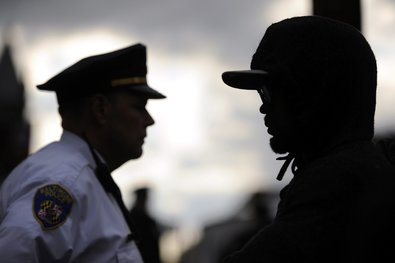
   |

Baltimore and Bolstering a Police Officers’ Right to Remain Silent
Many in Baltimore are enraged not just by the death of Freddie Gray in police custody but by the mystery that surrounds his death after a ride in a police van. This mystery exists because the officers who could say what happened are protected by a Law Enforcement Officers Bill of Rights, which limits and delays questioning police about potential misconduct. The idea behind such laws in 14 states, and similar contractual rights in some jurisdictions, is that no one should be forced to speak to investigators and possibly incriminate themselves. Do such measures protect the constitutional rights of police, or do they unnecessarily impede investigations of possible wrongdoing?
* enrage = 격분하게 만들다/ custody = 유치, 구류; 양육권/ bill of rights = 권리 장전/ misconduct = 위법(불법), 비행, 직권 남용/ jurisdiction = 관할권; 사법권/ incriminate = ~이 유죄인(잘못한) 것처럼 보이게 하다/ impede = (진행을) 지연시키다(방해하다) ![]() 위와 같은 조치는 경찰의 헌법상의 권리를 보호하나요 아니면 불필요하게 가능한 범법 행위의 조사를 방해하나요?
위와 같은 조치는 경찰의 헌법상의 권리를 보호하나요 아니면 불필요하게 가능한 범법 행위의 조사를 방해하나요?
1. A Double Standard in 14 States
It is far from a fanciful concern that the police will take advantage of all the extra due process they get under Maryland law to concoct an alternative version of events.
2. Greater Scrutiny Makes Officer Vulnerable to False Charges
These requirements help to protect the officer as a public employee but also ensure the integrity of the investigative process.
3. Police Protections Don’t Account for the Silence
Some of these provisions are excessive. But even without them, due process protection would require prosecutors to tread carefully.
Sample Essay
The Police Officers’ Bill of Rights Creates a Double Standard
When I was a prosecutor, nothing made a police officer angrier than being treated like a suspect. If we prosecutors asked the officer too many questions about how he obtained evidence or if we questioned his credibility in any way, he would catch an attitude. “Don’t treat me like a suspect” communicated that officer’s belief that he didn’t have to follow the same rules as the citizens he serves and protects. The Law Enforcement Officers Bill of Rights makes that double standard the law in 14 states.
Here is one of the many reasons that the city of Baltimore erupted in flames this week. When police officers first encountered Freddie Gray he was alive and walking. After a week in their custody, he was dead with a severed spine and a crushed voice box. And the mayor and the police chief say they have no idea how that happened.
Say that the police suspect a civilian of a horrible crime, like killing a man by breaking his spine. Within the crucial first 24 hours after the crime, the cops would put the man in a room, read him his Miranda warnings and then go to work. They would try to get him to talk, perhaps by lying to him, or threatening him, or by wearing him down. Maybe it works, maybe it doesn’t. But any cop worth her salt would try because, hell, it’s homicide investigation.
Unless, thanks to the Maryland Law Enforcement Officers Bill of Rights, it’s a homicide investigation of a police officer. Lucky for them, those cops don’t get treated like some suspect. Among other things, they get 10 days before they have to say a mumbling word.
It is far from a fanciful concern that the police will take advantage of all the extra due process they get under Maryland law to concoct an alternative version of events. Indeed, in the Freddie Gray case, they have already done so. The police report filed the day Gray was arrested states that he was taken into custody “without force of incident.” That is a big lie, the cell phone videos of the arrest subsequently revealed. It will be interesting to see what else got added to the story in the nine other days before those police officers were required to talk to investigators.
It’s strange that a law that thwarts transparency and accountability is called a “bill of rights.” The Law Enforcement Officers Bill of Rights has the same relationship to a real bill of rights that the Patriot Act has to a real patriot. The real Bill of Rights — the one enshrined in the United States Constitution — actually limits the power of government, including the police.
When I heard President Obama use the word “thugs” in talking about the situation in Baltimore, I did not know if he meant the people participating in the urban insurrection or the police who arrested Freddie Grey. Here is what I do know: In a democracy an accused “thug” should not get more rights just because he wears a badge and a gun.
   |




